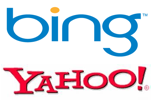Earlier, I discussed in detail why I think generic domain names are so important, and I would now like to provide a real world example of the importance.
My wife and I are looking to re-do our kitchen and bathroom floors. Black slate looks cool, but it’s difficult to clean and we want to give our kitchen a fresh look. While at dinner with friends on Friday, we saw that they had black granite flooring that my wife and I both liked. We decided that we were going to look into new flooring options, and our first to stops were HomeDepot.com and Lowes.com, both of which did not have the type of flooring that we want.
Since we haven’t done much renovation other than wood floors from Home Depot, we don’t really know many home improvement or renovation stores in New York, and I haven’t owned or needed a phone book in about 8 years. That said, my first step in searching for granite floor tile were Google searches for “granite floor tiles,” “granite floor tile,” and “granite flooring.”
Had any of these domain names been owned by a flooring company, it’s likely they would have ranked fairly high in Google, since the term isn’t ultra competitive. Fortunately for the existing companies (well, the 5 highest ranking companies anyway), the keyword domain names, GraniteFloorTiles.com, GraniteFloorTile.com, and GraniteFlooring.com aren’t developed.
People often look at generic domain names for their type-in visitor value. Although this is important, it isn’t the primary reason why I like generic domain names. Based on my development experiences, I have found that keyword domain names generally rank very well in the search engines (Bing moreso than Google), while their competitors with more brandable domain names don’t rank nearly as well.
I may or may not have bought my granite tiles from GraniteFlooring.com, but when all things considered are equal and I don’t have any brand loyalty to a local store, it makes things easier for the company to rank well organically and not have to consistently pay for visitors through SEM, which can be useful but requires continued investment. Generic domain names aren’t the answer, but they make finding the answer much easier.




 Most of my domain purchases have come from either direct inquiries to domain owners after
Most of my domain purchases have come from either direct inquiries to domain owners after  The Yahoo and Microsoft on-again off-again partnership/buyout discussions have been all over the financial and Internet news for a while, so I don’t need to chronicle those here. Yesterday afternoon, news broke that Yahoo and Microsoft were not only talking once again, but a deal was imminent. This morning it was announced that a deal between the two companies had been completed – finally.
The Yahoo and Microsoft on-again off-again partnership/buyout discussions have been all over the financial and Internet news for a while, so I don’t need to chronicle those here. Yesterday afternoon, news broke that Yahoo and Microsoft were not only talking once again, but a deal was imminent. This morning it was announced that a deal between the two companies had been completed – finally.